Agriculture and Biosecurity newsletter: July 2024
Opening piece from Chief Veterinary Officer, Rob Williams
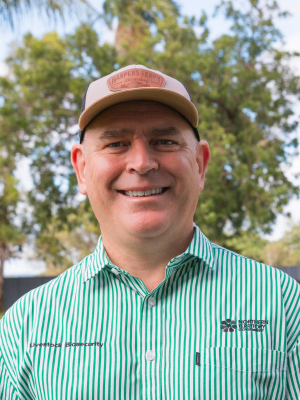
There has been considerable interstate media coverage recently about outbreaks of high-pathogenic and low-pathogenic avian influenza (HPAI & LPAI) across the country and overseas.
While there has been no detection of HPAI in the Northern Territory, it is important to understand the risks, and remain vigilant in the Territory for any signs of the disease.
Our teams have ramped up surveillance and monitoring and as a precaution the public are urged to report any sighting of sick birds or multiple unexplained bird deaths to the 24-hour Emergency Animal Disease Watch Hotline on 1800 675 888.
HPAI has been detected in poultry farms in NSW, Victoria and ACT and biosecurity responses have been activated, resulting in containment and eradication. There is no current threat to human health in Australia from this disease. Eggs and chicken meat products are safe to consume.
There is an increased risk of HPAI being introduced by wild or migratory birds flying long distances, particularly during August, September, and October. The Territory’s floodplain birds, such as magpie geese, and our native bird population are at risk. HPAI can impact seabirds, waterbirds, shorebirds, and birds of prey, such as eagles and hawks.
I encourage you to be vigilant and report any sightings of severely ill or dead birds or poultry by calling the emergency animal disease hotline on 1800 675 888.
Early detection is essential in managing the spread of this virus. If you suspect an animal might be infected, you have a legal responsibility to report it.
Stay tuned for updates on our website, and access more information on HPAI on the Wildlife Health Australia website.
Cheers,
Rob Williams
Chief Veterinary Officer
What’s new
Upskilling the pastoral industry
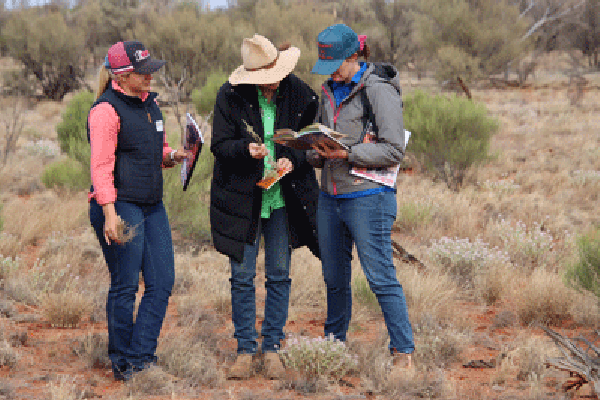
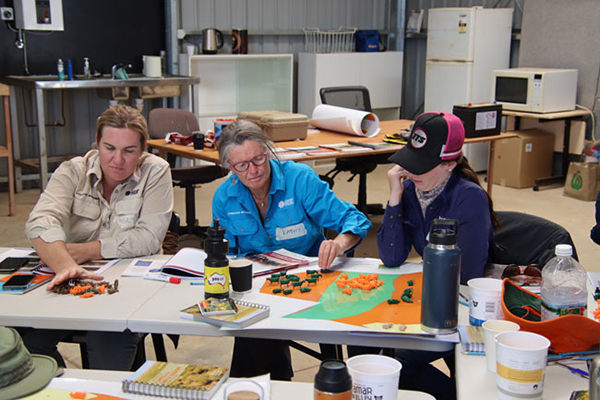
The Territory Government, in partnership with the Future Drought Fund's Northern Hub, is proud to be delivering free Rangeland Management Courses for employees across the Territory.
Empowering future land managers with the knowledge and skills to sustain healthy rangelands, these courses have been revitalized with updated materials and a brand-new program tailored for the Alice Springs region.
Last month, two successful sessions of the Central Australian course were delivered. Attendees gained valuable knowledge in cattle management, station profitability practices, and weed management.
The first session took place at DITT’s Old Man Plains Research Station (OMP), a 522km2 facility located 20km south-west of Alice Springs. Participants included representatives from the DEPWS Rangeland Monitoring Team, DITT Biosecurity, Elders Alice Springs, and OMP farm staff.
The second session was delivered a bit further south at Lyndavale Station, a fourth-generation family-owned and operated business that produces grass-fed, certified organic, and EU-accredited beef. Station staff learnt about pasture identification, grazing management, cattle nutrition, fire management, weeds and poisonous plants.
Both sessions were extremely well received and garnered great feedback.
Launched in 2022, the Central Rangeland Management Course helps educate the next generation of station head stockmen and women, managers and owners, to manage rangelands for long-term sustainability and profitability. Delivered on-property, the one-day course is aimed at less experienced station staff or those new to Central Australia.
For more information or to make a booking, contact Alison.Kain@nt.gov.au or call (08) 8951 8101.
Partnering to showcase the best in horticulture and produce

The Department of Industry, Tourism and Trade has successfully bid to partner with Hort Innovation and attend the 2024 Asia Fruit Logistica tradeshow in Hong Kong from 4 to 6 September.
Asia Fruit Logistica is a premier platform for NT growers to exhibit their fresh produce and connect with buyers from around the world.
Hort Innovation is coordinating a significant presence at the event, including project and logistics management, business matching in collaboration with Austrade, and activities to drive brand awareness and visibility.
Territory growers and exporters of horticultural produce interested in participating in the delegation can apply now through an EOI process.
Expressions of Interest will close at 5pm on Wednesday, 24 July.
For more information visit Asia Fruit Logistica or contact Jenny.Hill@nt.gov.au.
Native ladybirds to combat papaya mealybug
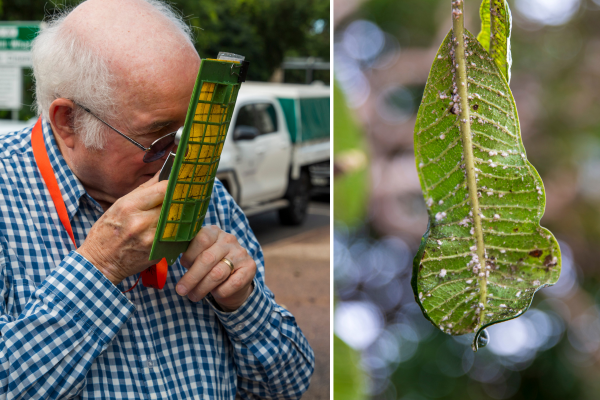
An innovative environmental trial is underway to reduce the impact of this invasive insect on plants across Darwin.
Papaya mealybug (Paracoccus marginatus) represents a threat to commercial papaya production and backyard trees.
In a bid to manage the spread, hundreds of native mealybug ladybirds (Cryptolaemus), natural predators of the papaya mealybug, have been released onto trees in the city’s Esplanade.
Since its discovery last year, the papaya mealybug has spread across many suburbs in Darwin, affecting frangipani, hibiscus, and papaya plants. It causes stunting and deformation of new growth, leaf yellowing, leaf curl, and early fruit drop. Fruit can become completely covered in a layer of mealybugs and wax secretions, rendering it hard and bitter.
The red and black ladybirds have earned a reputation overseas as the ‘mealybug destroyer’.
The trial's results will support further research and allow the team of scientists to make recommendations on the ladybirds’ efficacy in managing the papaya mealybug.
Suspected cases of papaya mealybug can be reported by calling the Exotic Plant Pest Hotline on 1800 084 881.
Supporting the sustainable growth of the mango industry
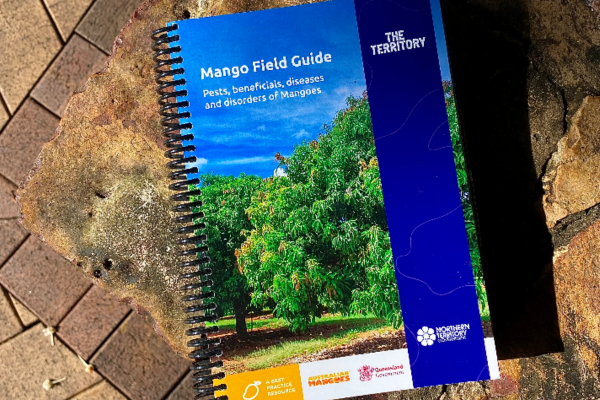
A revision of the Australian Mango Field Guide has been published to strengthen disease and pest management control across Northern Australia.
Now, in its third edition, the guide was developed by the NT Government in collaboration with the Queensland Department of Agriculture and Fisheries and the Australian Mango Industry Association.
This updated version features essential information for growers to identify pests, beneficials, diseases, and disorders of mangoes. It provides details on their biology, including life cycles, damage, distribution, and critical monitoring times - to inform management decisions. Also included is a new section on the high-threat species to look out for to support surveillance of exotic insects and diseases that could impact the industry.
The redevelopment of this guide continues to support mango growers' evolving use of integrated pest and disease management based on biological control, host plant resistance, cultural practices, and the application of appropriate chemicals.
Pest and disease management is critical to protecting the NT’s mango industry and ensuring sustainable growth.
The Territory is Australia’s leading producer of mangoes, with 6350 hectares of land used to grow different varieties. Generating around $128 million annually, the mango industry is our largest horticultural export crop.
Download the 2024 Mango Field Guide here:
- Part 1 - pests PDF (13.3 MB)
- Part 2 - beneficials PDF (10.9 MB)
- Part 3 - diseases and disorders PDF (10.4 MB)
- Part 4 - biosecurity threats PDF (8.0 MB)
For more information on pest and disease management, email the entomology team at insectinfo@nt.gov.au.
Industry recognition for National Biosecurity Training Hub
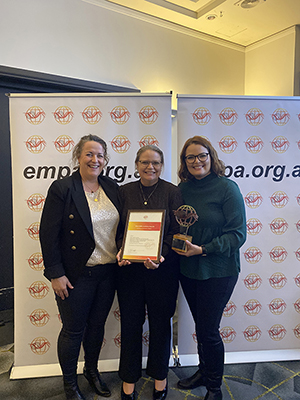
Australia’s one-stop shop for biosecurity training has won an Emergency Management Public Affairs Award for Readiness and Resilience, recognising its significant contribution to emergency communication.
Developed by Plant Health Australia in partnership with the Queensland Department of Agriculture and Fisheries, New South Wales Department of Primary Industries, Agriculture Victoria and Animal Health Australia, the Hub was established in 2023 to boost Australia’s preparedness and response capability. It provides a national repository of online biosecurity training for industry, government and community, connecting biosecurity training providers nationwide.
This award acknowledged the communication campaign developed to launch the Hub, demonstrating the importance of having a centralised and coordinated national approach to building and supporting biosecurity preparedness and response capability.
Learn more about this ground-breaking initiative by visiting the National Biosecurity Training Hub.
Central Australian pastoralists share insights in podcasts
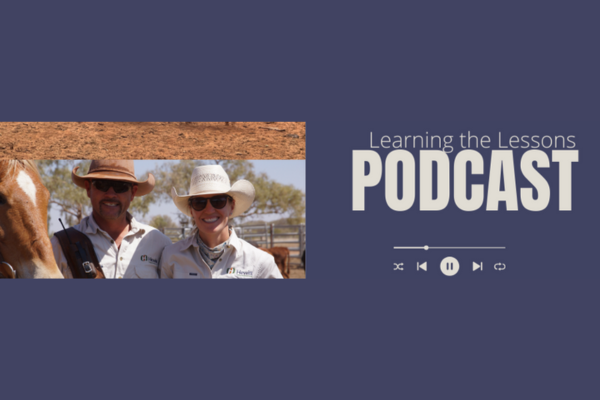
A three-part podcast series aptly named ‘Learning the Lessons’ offers deep dives into the management of beef enterprises in a variable climate.
The NT Cattlemen’s Association (NTCA) produced the podcasts with support from the Northern Hub, the Australian Government’s Future Drought Fund and the NT Government.
The podcasts showcase the experiences and strategies of Central Australian pastoralists and discuss what it takes to manage beef enterprises effectively in a variable climate. Topics covered include changes in the industry, current approaches to improving production outcomes, and ways to enhance sustainability.
Podcast 1: Andy and Steve Hayes, the Garden Station
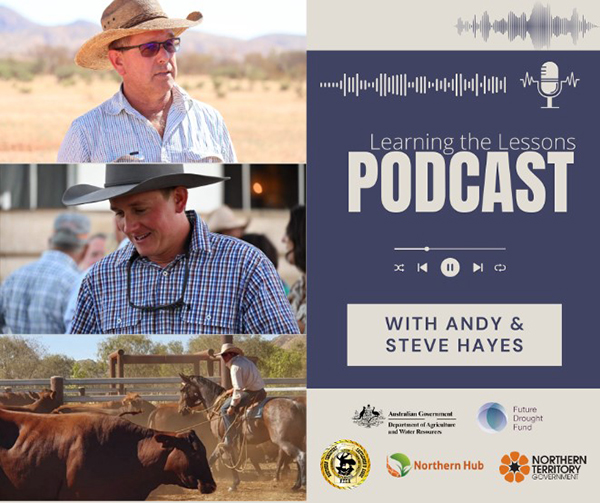
From herd transitions to innovation, Andy and Steve Hayes from The Garden Station share experiences, learnings and ideas spanning two generations and beyond – as they work together to build a successful family beef business in the Red Centre.
Podcast 2: Willy Brown, Hewitt Australia
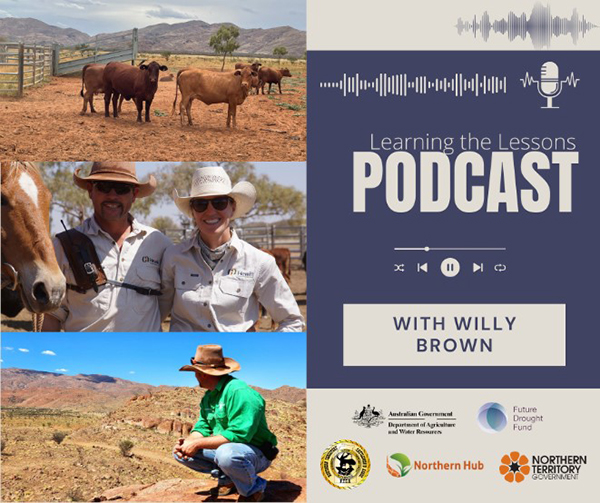
Having worked in various cattle operations across the country, Willy shares his approach to managing a vast aggregation in the Alice Springs region (Hewitt Australia)—one that involves a variety of landscapes. His commitment to sustainability is driving positive outcomes for the company’s organic beef operations.
Podcast 3: Rebecca Cadzow, Mount Riddock Station
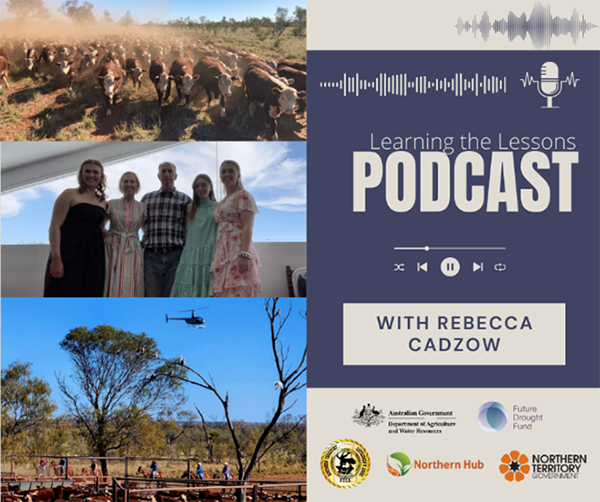
The Cadzow family purchased Mount Riddock Station over 30 years ago and quickly made vast capital improvements. They focused on herd genetics and restructuring their management approach to best suit the landscape. Rebecca shared her family’s story so far, as they focus on efficient, productive, and sustainable organic beef production.
Climate-sustainable beef industry on show

Northern Australia’s cattle industry was well represented at the week-long Beef2024 conference held in Rockhampton, Queensland recently, which saw nearly 120,000 people pass through the gates.
Held every three years, Beef2024 is an important collaborative and knowledge-sharing event for policymakers, researchers, producers, buyers, chefs and consumers alike, particularly as the industry moves to more sustainable and climate-resilient practices.
Beef2024 attracted political leaders, including Prime Minister Anthony Albanese, Agriculture Minister Murray Watt, and Department of Agriculture, Fisheries and Forestry Secretary Adam Fennessy PSM.
At the event, the Prime Minister announced that $519.1 million in funding from the 2024-25 Budget was being invested into the Future Drought Fund to help farmers and regional communities prepare for the next drought and build climate resilience.
Minister Watt also announced a $4 million Livestock, Animal Traceability Development, Implementation, and Improvement Grant Round to support the industry by helping businesses integrate new and improved traceability systems.
Live export industry panel
The Northern Territory Cattlemen's Association (NTCA) made its voice heard at the event, with representatives expressing concern at the Australian Government’s lack of support for the live cattle export sector and its declining prospects.
NTCA CEO Will Evans expressed disappointment in the scrapping of the student exchange program, which has brought over 200 Indonesian students to Top End cattle properties in the past decade. He highlighted the Australian Government’s shift in attention away from beef and onto mining and critical minerals in Indonesia, as well as the recent rejection of live exports due to sensitivities around Lumpy Skin Disease.
While the industry's future is undeniably bright, the NTCA emphasises that strong government support is essential to its success.

Live export panel members Ryan Olive, Will Evans and Greg Pankhurst speaking at the AAM panel.
Biosecurity at the forefront
NTCA’s Romy Carey and NACN's AgForce Project Officer, Roger Desailly, were in attendance to raise awareness of biosecurity.
'Biosecurity starts with you and me,' was the message from Queensland’s Chief Veterinary Officer, Dr Allison Crook, during a panel discussion about emergency animal disease responses.
Dr Crook spoke about Australia’s robust, proven framework, which is ready for an emergency disease outbreak.
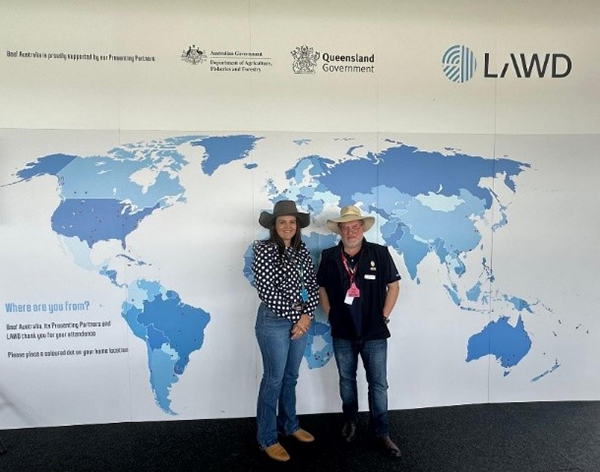
NTCA’s Romy Carey pictured with NACN's AgForce Project Officer Roger Desailly.
Developing future leaders
The late Graeme Acton's legacy to nurture young talent in the beef industry was commemorated during Beef2024.
Ten new graduates of the Graeme Acton Beef Connections program were celebrated. The NTCA’s Isobel Heffernan showcased their final projects on topics ranging from promoting agricultural education to developing eco-friendly packaging.
Aimed at grooming the next generation of industry leaders, the program matches mentees with industry experts.
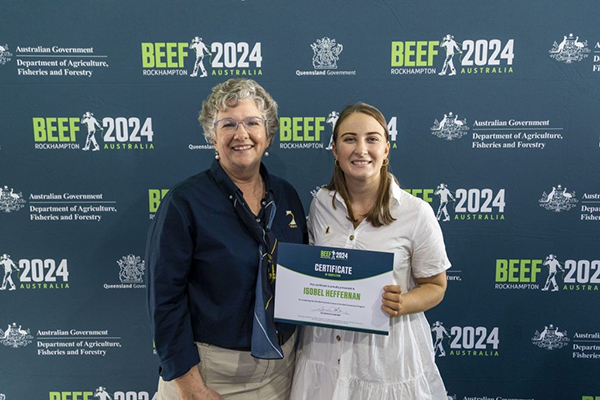
NTCA’s business development officer, Isobel Heffernan, with mentor and AgForce Chair Georgie Somerset.
Help protect our citrus industry and host a sticky trap in your garden
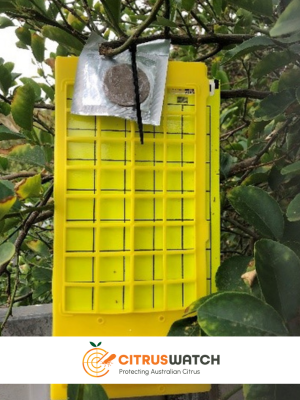
CitrusWatch is a five-year national program that aims to protect the Australian citrus industry through pest surveillance, training, and research.
The CitrusWatch team are conducting surveillance for exotic citrus pests such as the Asian citrus psyllid (ACP).
How to be involved
Do you have a citrus tree in your garden?
Your tree could host an insect trap, helping to keep Australian citrus safe, and adding crucial data to our national surveillance program.
All you need to do is place the provided sticky trap in an ACP host plant (citrus, curry leaf or Murraya paniculata) for two weeks.
After that, it’s a simple case of removing the trap and putting it in the post for checking by entomologists in Darwin.
Everything you need including sticky traps, instructions and pre-paid envelopes for trap return are provided.
Register today to become a CitrusWatch volunteer.
Research, development and extension updates
Calling all jackfruit growers to elevate the industry’s potential
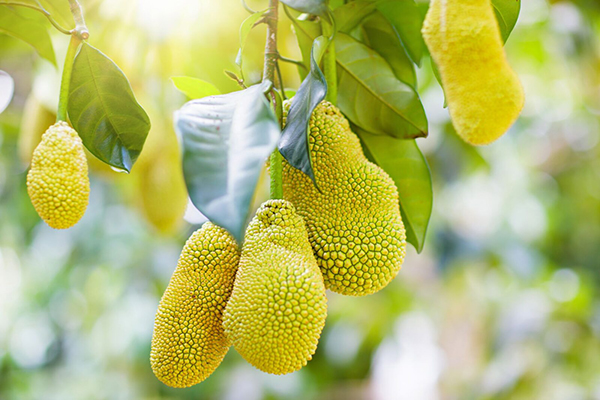
Top End commercial growers are encouraged to register their interest in a $1.3M project to develop Australia’s emerging jackfruit industry.
The joint NT Government and AgriFutures Australia project – Developing ready-to-market jackfruit products for Australian market growth – aims to grow the industry and refine commercially viable and processed jackfruit products.
The initiative is also focused on building networks with commercial partners across the supply chain to increase industry capacity and encourage the adoption of final products as a commercial reality.
NT growers are urged to participate in a trial examining the commercial viability of three new jackfruit products and identifying opportunities for diversification beyond fresh fruit.
Growers can contact the Department of Industry, Tourism and Trade to register their interest until April 2025, and provide fruit for a free evaluation to determine suitability for commercial processing.
To participate, you must:
- be a commercial grower
- provide a fresh fruit sample to the Department for destructive sampling.
All information collected through the EOI will be de-identified for reporting purposes.
Register your interest in the EOI by contacting Plant.Industries@nt.gov.au
Jackfruit is a tropical exotic fruit grown in northern Queensland and the Top End. Although it is widely cultivated throughout Asia, Australia's industry, currently worth around $2M annually, is still in its early stages. The fruit is gaining popularity for its varied potential uses in addition to fresh products.
This project is envisioned to enable the NT to explore future opportunities for commercial processing and establish a uniquely Top End product as popular as our world-renowned mangoes.
Workshops and events
Kidman Springs BeefUp Forum
Brought to you by MLA and the Department of Industry, Tourism and Trade, this 2-day event will cover local research, markets, nutrition, genetics and more.
Tuesday 20 and Wednesday 21 August, Kidman Springs.
Register on the Meat and Livestock Australia website.
Industry Liason Officer Training
Get ready to play an active role in enhancing your industry’s biosecurity preparedness, by attending Plant Health Australia’s free face-to-face Industry Liaison Officer training.
Thursday 22 August , Darwin.
Register on the Plant Health Australia website.
Give feedback about this page.
Share this page:
URL copied!